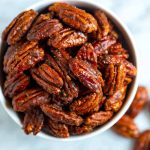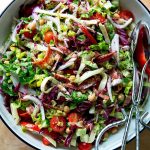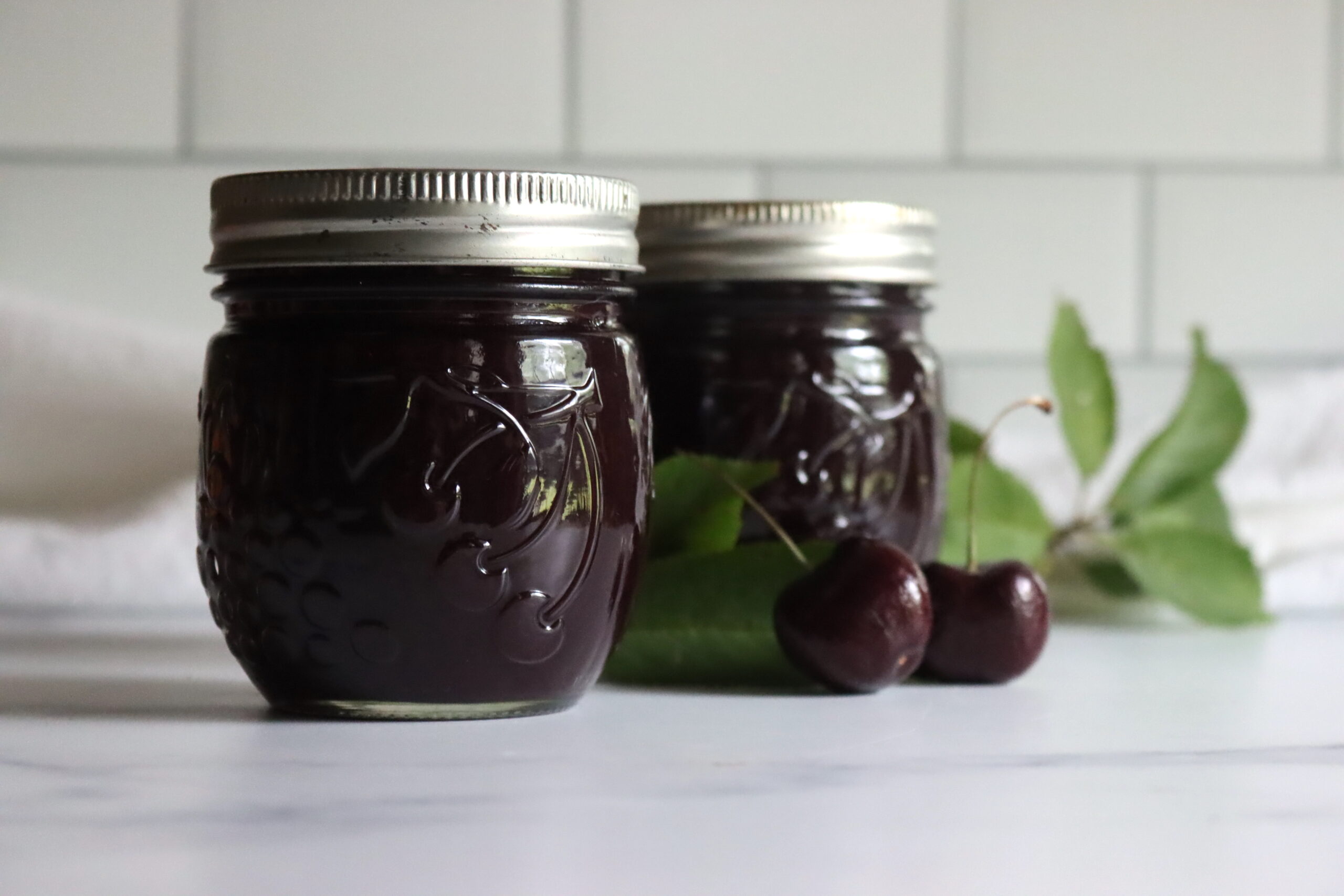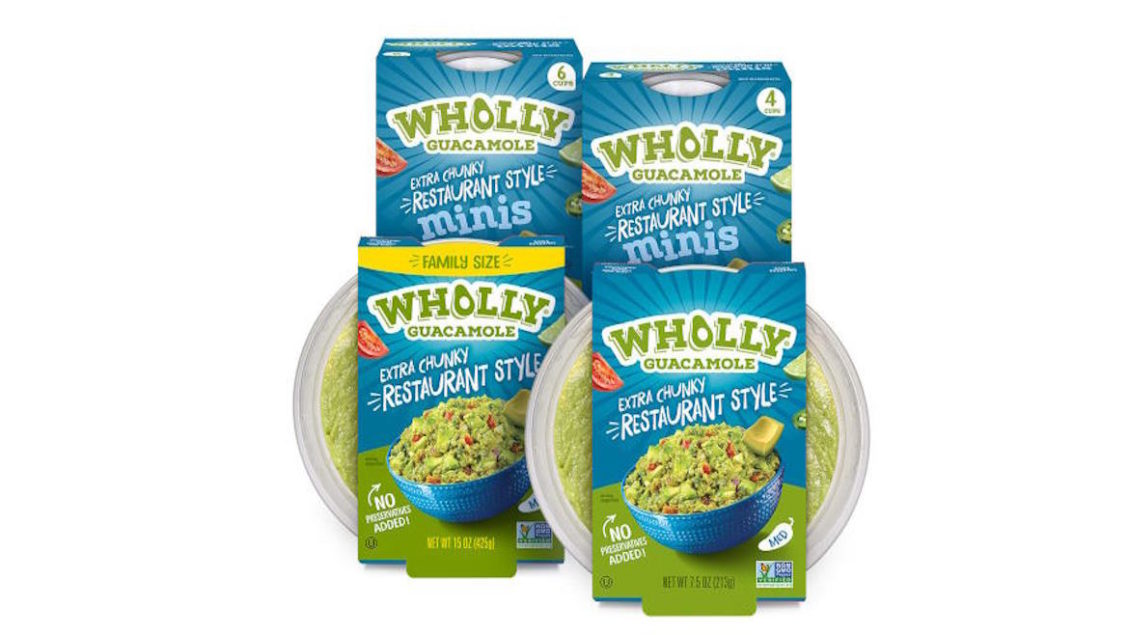Cherry Butter is a luscious homemade fruit spread with concentrated cherry flavor in every jar!
Fresh cherries are a real treat in season, but cherry season is over before you know it!
We make cherry jam every year, and it’s well worth the effort, but this time, I wanted an even more concentrated cherry flavor. When I came across this recipe for cherry butter, I knew I just had to make it.
Slow-cooking pureed cherries concentrates their flavor and give you a smooth fruit butter that’s perfect on top of desserts or simply spread on toast. (It also makes a great base for a homemade cherry BBQ sauce too!)
Ingredients for Cherry Butter
Sweet cherries make delicious jam and jelly, and if you love those, you’ll love this cherry butter! You get the full, wonderful flavor of the cherries in a smooth spread you’ll be happy to indulge in.
This recipe is adapted from Food in Jars: Preserving in Small Batches Year Round by Marissa McClellan.
To make 4 half-pint (8 oz.) jars or 2 pint (16 oz.) jars of cherry butter, you will need:
3 ½ pounds sweet cherries (6 cups pitted and chopped)
2 cups granulated sugar, divided
Juice of 1 lemon
If you buy whole cherries, you should get 3 ½ pounds of cherries, equivalent to 3 pounds without the pits. If you already have pitted cherries, use 6 cups for this recipe.
Cherries are naturally acidic, so the lemon juice is just added for flavor (and to help maintain vibrant color). Feel free to use fresh or bottled lemon juice, or increase/decrease the amount to suit your tastes.
Similarly, you can increase/decrease the sugar to suit your tastes, as it’s for flavor rather than preservation when canning this recipe. (Honey also works well as a substitute.)
How to Make Cherry Butter
Rinse the whole cherries with clean water and remove the stems.
You may want to purchase a cherry pitter tool if you do not have one. They can be very affordable and save significant time and effort in removing the pits from your cherries. I recommend this cherry pitter. (As a bonus, the tool also works to pit olives.)
Using a cherry pitter also helps retain more of the juice from the cherry. When I have to use a knife to remove the pits, I lose a lot of juice.
If using a cherry pitting tool, once you have the pitted cherries in a bowl, I like to use a salad chopper knife to chop the cherries in a bowl.
If you do not have a cherry pitter, use a paring knife to cut the cherries in half and use the knife to extract the cherry pit. The cherry pits will be discarded.
After removing all the pits and chopping the cherries, measure 6 cups of cherries and put them in a large saucepan or jam pot.
Add 1½ cups of sugar to the cherries in the pot and stir to combine.
Over medium-high heat, cook the cherries and sugar until the mixture comes to a soft boil, stirring frequently.
Reduce the heat to low and let the mixture gently simmer, uncovered, stirring occasionally. If the mixture starts sticking to the bottom, reduce the heat more if possible.
Allow the cherries to simmer for at least an hour until it has reduced in volume and is a deep red color.
Once the cherry mixture is cooked down significantly, puree the mixture using a food processor, immersion blender, or a food mill. Use caution when working with hot fruit to prevent splashing and burns.
Taste the cherry butter and add the remaining sugar if you desire.
Stir in the lemon juice.
Test the cherry butter thickness using a spoon and scooping a heaping spoonful out of the pot. If it forms a mound on the spoon, it is thick enough. If most of the cherry butter runs off the edges of the spoon, you need to continue to cook it longer.
Once the cherry butter has reached the desired consistency, remove the pan from the heat and, using a canning funnel, immediately pour or ladle the cherry butter into prepared jars or containers, leaving ¼” space at the top.
Wipe the rim of the container or jar with a clean, damp cloth and put lids on your containers.
Canning Cherry Butter
Prepare a water bath canner and jars while cooking the cherry butter. Please read my beginner’s guide to water bath canning before you get started if you are unfamiliar with hot water bath canning.
After you have cooked your cherry butter until it forms a mound on a spoon, carefully ladle or pour it into prepared hot jars, leaving ¼” headspace at the top of the jar.
Wipe the rims of the filled jars with a clean, damp cloth and apply 2 part canning lids. Do not overtighten the canning rings.
Load the filled jars into your preheated canner and bring the canner to a full rolling boil. Once boiling, process the jars for 15 minutes (or 20 minutes if above 6,000 feet in elevation). These times are for both pints and half pints.
Once the processing time is complete, turn off the heat and allow the jars to set in the water for an additional 5 minutes before you remove them from the canner.
Remove the jars from the canner with a jar lifter and set them to cool on a towel on the counter. After 24 hours, check the seals on the lids and store any unsealed jars in the refrigerator for immediate use.
Properly canned cherry butter will maintain quality in your pantry or other cool, dry place for 18 months. Refrigerate cherry butter once opened.
Cherry Butter Variations
Vanilla is a beautiful flavoring paired with cherries. Add a vanilla bean (with the seeds removed) or 3 tsp. of quality vanilla extract to the cherry mixture when cooking.
Adding other fruit to the cherry mixture can also produce fantastic flavors. Try adding a few plums, apricots, or peaches.
Yield: 4 half-pint (8-ounce) or 2 pint (16-ounce) jars
Cherry Butter
Prep Time:
20 minutes
Cook Time:
1 hour
Additional Time:
15 minutes
Total Time:
1 hour 35 minutes
Cherry Butter is a luscious homemade fruit spread with concentrated cherry flavor in every jar!
Ingredients
3 ½ pounds sweet cherries (6 cups pitted and chopped)
2 cups granulated sugar, divided
Juice of 1 lemon
Instructions
Rinse cherries under cool, running water.Remove and discard the cherry pits and chop the cherries in a bowl.Place the cherries in a large saucepan or jam pot. Add 1½ cups of sugar and stir to combine.Over medium-high heat, bring the cherry mixture to a soft boil, stirring often.Reduce the heat to low and allow the cherry mixture to simmer gently, uncovered, for at least one hour. Stir occasionally, and if the mixture begins to stick to the bottom of the pot, reduce the heat more if possible.Remove from heat once the mixture has reduced in volume and the color is deep red. Puree the cherry mixture in a food processor, food mill, or immersion blender to produce a smooth cherry pulp.Taste the cherry butter and add the remaining ½ cup of sugar if desired. Add the lemon juice and stir to combine thoroughly.Check the thickness of your cherry butter by scooping a spoonful of the mixture onto a spoon. If the mixture forms a mound, it is done. If the cherry butter runs off the edges of the spoon, cook the butter longer until it forms a mound on a spoon. Ladle or pour the jam into prepared jars or containers. Maintain ¼” headspace if you are going to can your cherry butter. Wipe the rims of the jars or containers with a damp, clean cloth and affix the lids.If canning, process the jars for 15 minutes (or 20 minutes if above 6,000 feet in elevation). These times are for both pints and half pints.
Notes
If you buy whole cherries, you should get 3 ½ pounds of cherries, equivalent to 3 pounds without the pits. If you already have pitted cherries, use 6 cups for this recipe.Cherries are naturally acidic, so the lemon juice is just added for flavor (and to help maintain vibrant color). Feel free to use fresh or bottled lemon juice, or increase/decrease the amount to suit your tastes.Similarly, you can increase/decrease the sugar to suit your tastes, as it’s for flavor rather than preservation when canning this recipe. (Honey also works well as a substitute.)
Cherry Canning Recipes
Looking for more ways to preserve cherries in a jar?
Fruit Butter Canning Recipes
Homemade fruit butters can be made with just about any fruit!










